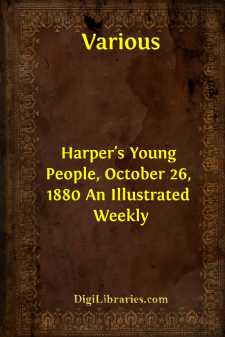Categories
- Antiques & Collectibles 13
- Architecture 36
- Art 48
- Bibles 22
- Biography & Autobiography 813
- Body, Mind & Spirit 142
- Business & Economics 28
- Children's Books 17
- Children's Fiction 14
- Computers 4
- Cooking 94
- Crafts & Hobbies 4
- Drama 346
- Education 46
- Family & Relationships 57
- Fiction 11829
- Games 19
- Gardening 17
- Health & Fitness 34
- History 1377
- House & Home 1
- Humor 147
- Juvenile Fiction 1873
- Juvenile Nonfiction 202
- Language Arts & Disciplines 88
- Law 16
- Literary Collections 686
- Literary Criticism 179
- Mathematics 13
- Medical 41
- Music 40
- Nature 179
- Non-Classifiable 1768
- Performing Arts 7
- Periodicals 1453
- Philosophy 64
- Photography 2
- Poetry 896
- Political Science 203
- Psychology 42
- Reference 154
- Religion 513
- Science 126
- Self-Help 84
- Social Science 81
- Sports & Recreation 34
- Study Aids 3
- Technology & Engineering 59
- Transportation 23
- Travel 463
- True Crime 29
Harper's Young People, October 26, 1880 An Illustrated Weekly
by: Various
Categories:
Description:
Excerpt
"What's your name, boy?"
The question came so suddenly that the boy nearly tumbled from the fence upon which he was perched, as Judge Barton stopped squarely in front of him, and waited for an answer.
"Wilbert Fairlaw, sir," was the timid reply.
"Go to school?"
"No, sir."
"Do any work?"
"Yes, sir; I 'tend marm's cows and fetch wood."
"Well, that's something. But don't you think there's plenty to do in this part of the world that's better than kicking your heels against the fence all the morning? Now just look around, my boy, until you find something that wants fixing up, and take off your coat and go at it. You won't have to look far about here." And the Judge gave a contemptuous glance toward the widow Fairlaw's neglected farm. "Take my word for it, boy," he added, "work's a mint—work's a mint." And then he turned away, walking with dignified pace toward the Willows—the name of his place.
Now I think that most boys would have been tempted to talk back, but Wilbert only sat still and looked after the man as he walked away, and then down at his bare feet.
"It's all true. Somehow our place does look badly, but I can't 'tend to everything," he thought, "like a hired man; an' if I did try to patch things, likely I'd get a lickin' for doin' something I oughtn't. I don't see as it makes any difference whether I work or not. It's all the same about here; but, oh, I would like to have something to do for pay, so I could have a little money—ever so little—and I could feel it in my pocket, and know it was there. I wonder what the Judge meant by saying, 'Work's a mint.' I guess it is something about getting paid. How I wish I had a little money! but I would like to earn it myself."
"Here, bub, get a bucket, will you, and bring my nag some water?"
This time it was a keen-looking young man sitting in a light wagon who addressed him.
"Now stir your pegs, bub, and here's a nickel for you."
Wilbert was already on the way to the well, for he was always quite willing to do a favor, and so he didn't hear the last sentence. Then he unfastened the check-rein by standing upon a horse-block, and gave the tired animal a pail of water.
The driver meanwhile searched his pockets in vain for a nickel.
"Got any change, bub?"
"No, sir."
"Well, then, never mind; here's a quarter to start your fortune. I guess it'll do you more good than it would me," and away he drove at a lively pace up the road, and Wilbert sat down in the grass by the road-side, too happy even to whistle or dance.
So people sometimes paid for having their horses watered? Why not keep watch for teams, and have a bucket ready? There was plenty of travel over the road. Carriage-loads of excursionists went by to the "Glen"—a resort about six miles distant—almost daily, and the only place to water on the way was always made muddy by the pigs.
But people wouldn't be willing to wait while he went clear to the well every time for water, especially when there were two horses.
Behind the barn lay an unused trough, made for feeding pigs....












